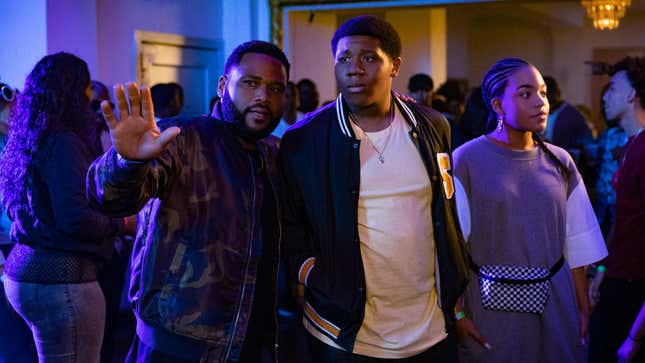
Chicago is a city that has been thrust into the abyss of exploitation, as national media has been lured by the city’s crime-ridden headlines. But what of the people who make up the city? What of their stories? What makes them tick? After all, the people are the heart of any city, in my opinion.
In Netflix’s Beats, director Chris Robinson has a goal to humanize that aspect.
Per the film’s official press release:
In this coming-of-age drama, a reclusive teenage musical prodigy (Khalil Everage) forms an unlikely friendship with a down-on-his-luck high school security guard (Anthony Anderson). United by their mutual love of hip hop, they try to free each other from the demons of their past and break into the city’s music scene. Directed by Chris Robinson (ATL, The New Edition Story), Beats features Everage in his feature film debut and co-stars Uzo Aduba and Emayatzy Corinealdi. Beats is the ultimate ode to Chicago’s South Side, and its long history of creating music that forms the city’s beating heart.
I sat with Anderson and Robinson in the American Black Film Festival (ABFF) press room to discuss the film, which I screened that afternoon. Along with asking whether they had Harold’s in catering/craft services (they didn’t—but, they’ve been blessed with that chicken shack throughout their respective lifetimes) and doing the typical namedropping of Chicago origins with Anderson (his mama is from Robert Taylor Homes, mine from Cabrini Green), we discussed how Beats tells one of the many stories of Chicago.
“There’s trouble in Chicago,” Robinson said. “That is a problem, there’s a lot going on this summer. What we tried to do in this film—and what’s reality in every city—is amongst all that, there’s joy, relationships, beauty and love. There’s people trying to help each other and there’s magic in that. There’s a lot of reasons that Chicago is how it is. A lot of it has to do with shutting down schools. [Before], the culture [of] gangs was to protect the neighborhood and [now you have] what it [has] turned into. We didn’t address everything that [is happening] in Chicago, but we wanted to paint a real picture of it. And part of that real picture is the loving relationships between family.”
South Side Chicago is represented in both the joy (there’s a scene located at Harold’s #35) and pain of Beats (a discussion between Anderson and Everage about how redlining affects Chicago residents to the point where they have never left their neighborhoods or visited the downtown area). There is one thing that sticks out, though: Anderson keeps pronouncing Roseland (a Chicago neighborhood) as “Rose-LAND” when, in reality, it rolls off the tongue more like, “Roselin.” Hey, those regional phonetics matter!
Speaking of joy, I had to ask the two men my standard question: What was your blackest moment on set?
“[It was with] Chris Robinson—First day; first scene; first shot ... [He says,] ‘Cut! Uh, Anthony can you give me less forehead acting?’ I said, ‘What the fuck are you talking about?! [...] I’m acting! My forehead frowns up because of the scene I’m in! That’s what it does!”
Forehead acting or not, Anderson couldn’t stop praising young Everage.
“Khalil is a great young actor,” Anderson noted. “It took us a while to find a lead. We talk about authenticity and whatnot and I don’t think there was a better person out there for the role than Khalil. Just seeing the work that he did and watching him evolve over the process and then at the end, seeing the films like ‘Oh shit.’”
Oh shit, indeed. It is Everage’s vulnerable portrayal as a young black boy with severe post-traumatic stress disorder that endears the audience. Though the third act seems jumbled and loses me a bit, it is Everage’s underdog aura that keeps me watching and rooting for his character. You just want to hug him.
“This kid is dope and he grounds our piece with this sense of real illness and authenticity of a kid that’s truly from South Side Chicago,” Anderson adds.
Beats is now available on Netflix.

